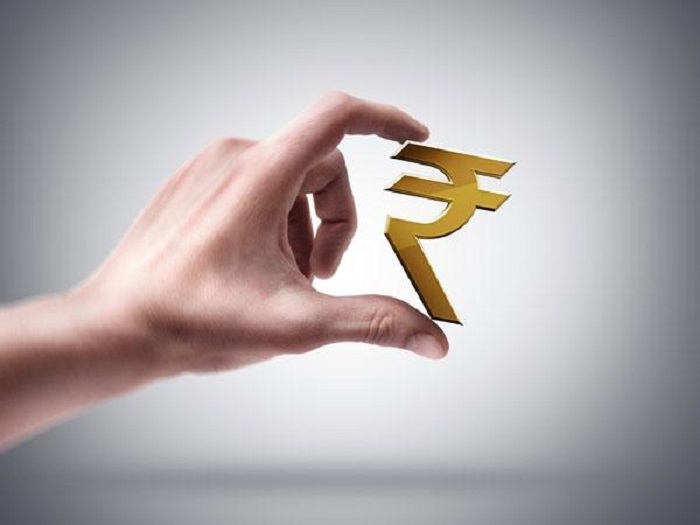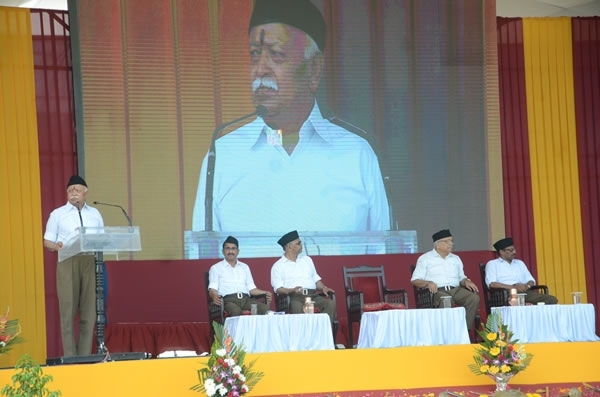RSS chief advocates inclusive approach to economic issues

The traditional Vijayadashami speech of RSS Chief Dr. Mohan Bhagwat on the RSS foundation day can virtually be seen as a charter of action for India as visualized by RSS. This yearly address is heard by RSS cadre as the vision document for the coming year delivered by RSS Sarsanghchaalak and is taken as a guideline. However, political ascendancy of BJP, widely seen to represent RSS ideas in political sphere, has persuaded political commentators to hear this speech keenly.
Generally, outsiders take just 1 or 2 ideas as clear take away from this speech. However, this time Dr. Bhagwat’s speech has covered lot more points and has touched nearly entire gamut of the national life.
I will focus on the economic aspect of this speech. In the background of many huge steps taken by the Modi government, it is but natural. Huge infrastructural spend, inclusive fiscal policies, efforts to reach out to the last person in queue with free gas connections, Jan Dhan Yojana, Mudra Bank, power to all, more pragmatic agriculture insurance, focused irrigation policies etc. have differentiated this government from the previous ones. Swachhata Abhiyan is an idea not only of social reforms but of huge economic gains. One wonders why nobody thought about it for seven decades. It touches very life with promise of growth with dignity.
To top it all, hugely disruptive steps like Demonetization and GST implementation have also shaken up the entire economy and peoples’ mind set. Disbanding the Planning Commission that treated, many times, state governments like serfdoms is a great sign of decentralization espoused by RSS and BJP.
While talking of possible new solutions for Indian economy, RSS Chief noted that we should consider diversities and different requirements of our vast nation. This is very crucial for economic uplift. He asked government and its administrators not to accept any good idea as it is, but tweak it to Indian conditions. He underlined the importance of MSME and agriculture for regeneration of the Indian economy.
His stress on survival and importance of small industries, self-employed and the traders as prime movers of economy and job generators seems to have been driven by concerns about implementation of GST that has disturbed large number of groups in this segment. This may be translated into his saying that laws and policies should be simple, easily adopted by our people in general and shouldn’t damage the segments that gives maximum employment.
The RSS Chief stressed the importance of creating our own paradigms and not copy western models of economic wellbeing. He gave example of Gross Domestic Product (GDP) and how Bhutan refused to accept it as a parameter of national wellbeing to create its own Happiness Index. We too need to create our own parameters. GDP may create a mirage of prosperity but it hides wide discrepancies and inequality in society which is increasing alarmingly. He suggested that Niti Ayog and advisors to the government should come out of the old economic ‘isms’ and integrate global experiences into ground reality of this nation.
Can ‘Integral Humanism’ presented by Late Deendayal Upadhyay help evolve a new economic model for India? I believe it can. Swadeshi movement that began in 1991-92 in the wake of liberalization to save domestic industry did make some points but ended up only as a protest group. It has not taken Integral Humanism as the foundation of a new Indian economic order to build an alternative model. BJP too so far paid only lip service, while following typical western model, till Mr. Modi came in.
I wrote an article for Newsbharati "Modi and Integral Humanism" some months back, wherein I had suggested that economic policies of Mr. Narendra Modi reflect the inclusive and egalitarian ideas of Integral Humanism. I highlighted how he has tried to reach out to the last person in the queue with key idea of Antyodaya expounded in Integral Humanism.
We find that western think tanks construct ideas with a long term vision that are adopted by their governments. However, we find that our think tanks are highly influenced by Marxist or Western Capitalist ideas. Government policy groups are still unable to come out of Nehruvian thought process. With half the government advisors descending from World Bank background, it is but natural. This is where RSS needs to step in and seriously create its own think tanks to evolve new parameters of progress and policies that provide equal playing field to different social groups to rise to their best potential. Onslaught of Left on alternative viewpoints should not dissuade such Think-Tanks to dilute their views to pull in fence sitters onto its band-wagon.
Prime Minister Modi has come up with policies to encourage entrepreneurial spirit with Mudra Bank and Skill development. Our think tanks had hardly any role to play in this change in thinking from mai-baap sarkar of doles to an enabler. This change in many fundamental policies has not found favour with bureaucracy. In moves, quite familiar for government watchers, bureaucrats have created roadblocks or diversions in implementation with some quirky control points wherever possible.
Implementation of GST clearly shows lack of sensitivity to the concerns of small business and common people about which the RSS Sarsanghchaalak talked about. Crux of the problem is the urge of bureaucracy to control people’s lives with draconian and difficult to understand laws and twist them to their will, so that lubricants keep flowing. Ministers are seen helpless in this regard.
Talking of GST, multiple slaps, different tax rates with one group of products – say for example luggage and bags, unnecessary paper work in matters like e-way bills, multiple returns even for small businesses, serious penalties on genuine mistakes, officers deciding a manufacturer’s margins are all recipe for disaster or failure of this ambitious move.

Agriculture is biggest employment generator and needs urgent redressal. RSS has been promoting organic farming and use of cow as the vehicle of economic wellbeing of the farmers. It has opposed GM seeds. Its affiliates have done a good amount of work in isolated pockets to present models of Integral Humanism on the ground. Deolapar cow research institute near Nagpur, Gonda experiment of Late Nanaji Deshmukh, individual efforts by many people in working on integrated development of villages in Maharashtra like Hirve Bazar village haven’t reached a point where they become mainstream ideas to be adopted by the governments.
This is where RSS may need to work harder. Challenge is how to replicate and promote such examples and provide the government with enough data to help it make informed policies. This can give much needed fillip to agriculture and employment. I have seen humungous historic data that Swadeshi movement has about typical Indian model of economic development. Coimbatore, Thirupur, Ludhiana industrial clusters show the way. But, this data is presented only in seminars, not converted into policy documents.
There is a growing concern about the ‘missing middle’, as a recent article in “The Hindustan Times” noted. This ‘middle’ is the small and mid-segment industry that has grown in all developed and emerging economies. Unfortunately, it has not grown in India even as economy grew. This should trouble all the policy makers. The reasons are outdated labour laws, difficult complex laws that hold back MSME. Ease of doing business has touched only large corporates. Blind opposition to new laws that can set free the genius of people running these industries without offering alternatives doesn’t help. Unless we evolve with times and changing technologies; we cannot rise as a nation; nor can we create an enabling environment where MSME, the middle expands and prospers, creating much needed jobs.
This message needs to go out. RSS has the reach and experience of over nine decades to take ideas of renaissance of India to the masses evolved through its nationwide footprint.
